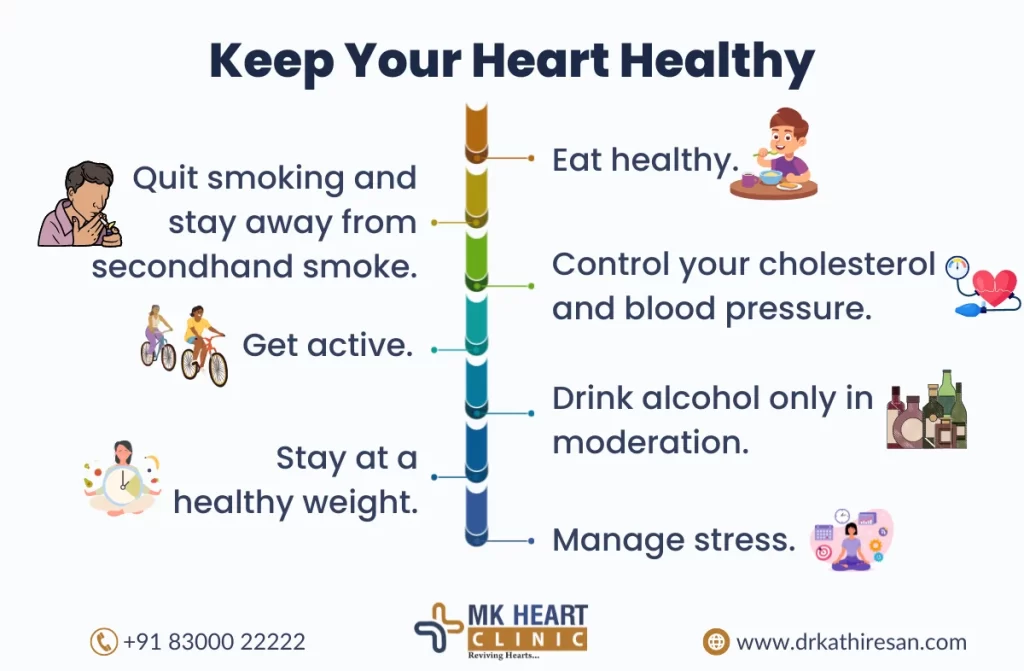Maintaining healthy heart habits like eating a balanced and nutritious diet is essential for overall health, especially for maintaining a healthy heart. The components of a heart-healthy diet include fruits, vegetables, whole grains, lean proteins, and healthy fats. In this blog, we’ll explore each of these components in detail, besides providing tips for incorporating them into your daily routine.
Fruits and Vegetables
Eating Fruits and vegetables daily is one of the healthy heart habits that is an essential component of a heart-healthy diet. They are low in calories, high in fiber, and rich in vitamins, minerals, and antioxidants that are essential for a healthy heart.
The American Heart Association recommends that adults eat at least 4-5 servings of fruit and 4-5 servings of vegetables every day. There are many creative ways to incorporate more fruits and vegetables into your meals. For example, you could add fresh berries to your morning oatmeal, or include a colorful salad with your lunch or dinner.

Whole Grains for Healthy Heart Habits
Whole grains are one of the vital components of a heart-healthy diet. Whole grains contain fiber, vitamins, minerals, and antioxidants that can help reduce the risk of heart disease. The American Heart Association recommends that at least half of your daily grain intake should come from whole grains.
Examples of whole grain products include whole wheat bread, oatmeal, brown rice, and whole grain pasta. Incorporating whole grains into your meals as healthy heart habits can be as simple as swapping out white bread for whole wheat bread or choosing brown rice instead of white rice.
Lean Proteins
Proteins are essential for good health, but it’s important to choose lean protein sources to reduce the risk of heart disease. Few lean protein sources include chicken, fish, tofu, and legumes. The American Heart Association recommends eating at least two servings of fish per week as a Healthy Heart Habits, as well as choosing plant-based protein sources whenever possible. To incorporate more lean proteins into your meals, you could try a tofu stir-fry for dinner, or include a side of beans with your lunch.
Healthy Fats
It’s important to choose healthy fats, such as those found in nuts, seeds, olive oil, and avocados, to support heart health. The American Heart Association recommends limiting your intake of saturated and trans fats and increasing your intake of healthy fats. Incorporating healthy fats into your meals can be as simple as using olive oil for cooking, or adding nuts to your morning oatmeal.
Putting it all together
If you want to follow healthy habits for heart, create a balanced and nutritious meal that incorporates all of the heart-healthy components. Firstly, start with a base of whole grains, such as brown rice or whole wheat pasta. Then, add a serving of lean protein, such as chicken or tofu, and plenty of colorful vegetables.
Finish with a drizzle of healthy fats, such as olive oil or avocado, to complete your meal. There are many delicious and simple recipes that incorporate these heart-healthy components. You can also try a quinoa salad with mixed greens, roasted vegetables, and a side of grilled salmon for a delicious and heart-healthy meal.
Conclusion
In conclusion, eating a balanced and nutritious diet falls under the category of healthy habits for heart. It also plays an essential role in maintaining a healthy heart. By focusing on fruits, vegetables, whole grains, lean proteins, and healthy fats, you can reduce your risk of heart disease and support overall health. Incorporating these elements into your daily routine is more achievable than you may imagine. With a little creativity and planning, you can enjoy delicious, heart-healthy meals every day.
Also, Read Primary Percutaneous Coronary Intervention in Chennai.



